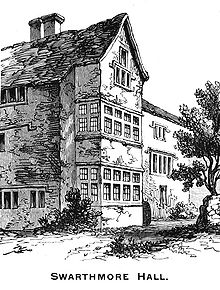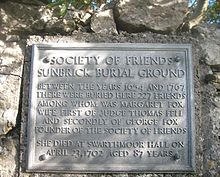- Margaret Fell
-
Margaret Fell or Margaret Fox (1614 – 23 April 1702) was a founder of the Religious Society of Friends. Known popularly as the "mother of Quakerism", she is considered one of the Valiant Sixty early Quaker preachers and missionaries.
Contents
Life
She was born Margaret Askew in Dalton-in-Furness, a small town in the north of England. (Dalton was then in Lancashire and is now in Cumbria). She married Thomas Fell, a barrister, in 1632, and became the lady of Swarthmore Hall. In 1641, Thomas became a Justice of the Peace for Lancashire, then in 1645 he became a member of Parliament.[1] Thomas Fell ceased to be a member from 1647 to 1649 when he disapproved of Oliver Cromwell's assumption of authority.[2]
In late June of 1652, George Fox visited Swarthmoor Hall. Margaret was away when he arrived, but upon her return in the evening, Margaret Fell met him who 'opened us a book that we had never read in, nor indeed had never heard that it was our duty to read in it (to wit) the Light of Christ in our consciences, our minds never being turned towards it before.'[3] A day or two later it was lecture day at the parish church, and Margaret invited George Fox to attend with them. Initially he declined, but then came in after the singing and asked for liberty to speak. It was here that Margaret heard the ministry of George Fox and she was so stirred by his the beginning of his speech, she stood up in her pew and wondered at his doctrine. Over the next weeks she and many of her household became convinced.[4] Over the next six years, Swarthmoor Hall became a center of Quaker activity; she served as an unofficial secretary for the new movement, receiving and forwarding letters from roving missionaries, and occasionally passing along admonitions to them from Fox, Richard Hubberthorne, James Nayler, and others. She wrote many epistles herself and collected and disbursed funds for those on missions. After her husband's death in 1658, she retained control of Swarthmore Hall, which remained a meeting place and haven from persecution, even though it was sometimes, in the 1660s, raided by government forces.
Because she was one of the few founding members of the Religious Society of Friends who was an established member of the gentry, she was frequently called upon to intercede in cases of persecution or arrest of leaders such as Fox. After the Stuart Restoration, she traveled from Lancashire to London to petition King Charles II and his parliament in 1660 and 1662 for freedom of conscience in religious matters. A submission signed by George Fox and other prominent (male) Quakers was only made subsequently in November of 1660. Although the structure and phraseology of these submissions were quite different, the import was similar, arguing that, although Friends wished to see the world changed, they would use persuasion rather than violence towards what they regarded as a "heavenly" (i.e. spiritual) end.
In 1664 Margaret Fell was arrested for failing to take an oath and for allowing Quaker Meetings to be held in her home. She defended herself by saying that "as long as the Lord blessed her with a home, she would worship him in it". She spent six months in Lancaster Gaol, whereafter she was sentenced to life imprisonment and forfeiture of her property. She remained in prison until 1668, during which time she wrote religious pamphlets and epistles. Perhaps her most famous work is "Women's Speaking Justified", a scripture-based argument for women's ministry, and one of the major texts on women's religious leadership in the 17th century.[5] In this short pamphlet, Fell bases her argument for equality of the sexes on the basic premises of Quakerism that is spiritual equality. Her belief was that God created all human beings, therefore both men and women were capable of not only possessing the Inner Light but also the ability to be a prophet.[6]
Having been released by order of the King and council, she married George Fox in 1669. On returning to Lancashire after her marriage, she was again imprisoned for about a year in Lancaster for breaking the Conventicle Act. Shortly after her release, George Fox departed on a religious mission to America, and he too was imprisoned again on his return in 1673. Margaret again traveled to London to intercede on his behalf, and he was eventually freed in 1675. After this, they spent about a year together at Swarthmore, collaborating on defending the recently created organizational structure of separate women's meetings for discipline against their anti-Fox opponents.
A plaque at the Society of Friends' burial ground in Sunbrick, Urswick, Margaret Fox's resting place
George Fox spent most of the rest of his life thereafter abroad or in London until his death in 1691, while Margaret Fell spent most of the rest of her life at Swarthmore. Surviving both husbands by a number of years, she continued to take an active part in the affairs of the Society including the changes in the 1690s following partial legal tolerance of Quakers, when she was well into her eighties. In the last decade of her life, she firmly opposed the effort of her fellow believers in Lancashire to maintain certain traditional Quaker standards of conduct (for example, in matters of dress). She died aged 88.
In literature
Margaret Fell's meeting with George Fox and her subsequent conversion are the subject of the first part of the novel The Peaceable Kingdom by Jan de Hartog.
- Claus Bernet (2002). Bautz, Traugott. ed (in German). Margaret Fell. Biographisch-Bibliographisches Kirchenlexikon (BBKL). 20. Nordhausen. cols. 481–494. ISBN 3-88309-091-3. http://www.bautz.de/bbkl/f/fell_m.shtml.
Notes
- ^ Ross 1984: 3
- ^ Ross 1984: 4
- ^ Spence Manuscripts. 3. p. 135.
- ^ Ross 1984: 11
- ^ Margaret Fell, "Women's Speaking Justified, Quaker Heritage Press Online Texts. Full Text.
- ^ Schofield, Mary Anne (1987). ""Women's Speaking Justified" The Feminine Quaker Voice, 1662-1797". Tulsa Studies in Women's Literature 6 (1): 61–77. JSTOR 464160.
References
- Ross, Isabel (1984). Margaret Fell Mother of Quakerism (2nd ed.).
- An abstract of the life of Margaret Fell
External links
- Swarthmoor Hall Website
- Women's Speaking
- Excerpted in the Norton Anthology of English Literature
- Margaret Fell's Letter to the King and Parliament On Religious Persecution, 1660
Religious Society of Friends Quakers List of Quakers · Anthony Benezet · Kenneth E. Boulding · Margaret Fell · George Fox · Elizabeth Fry · Edward Hicks · Elias Hicks · Rufus Jones · Lucretia Mott · William Penn · Robert Pleasants · John Greenleaf Whittier · John Woolman
Groups Testimonies Peace · Equality · Integrity · Simplicity
Other Businesses, organizations and charities · Clerk · History · Homosexuality · Inner light · Meeting houses · Query · Schools · Tapestry · Wedding · Women
Categories:- 1614 births
- 1702 deaths
- English Quakers
- Rhetoricians
- People from Dalton-in-Furness
- English women writers
- 17th-century women writers
- 17th-century Quakers
- 18th-century Quakers
Wikimedia Foundation. 2010.


